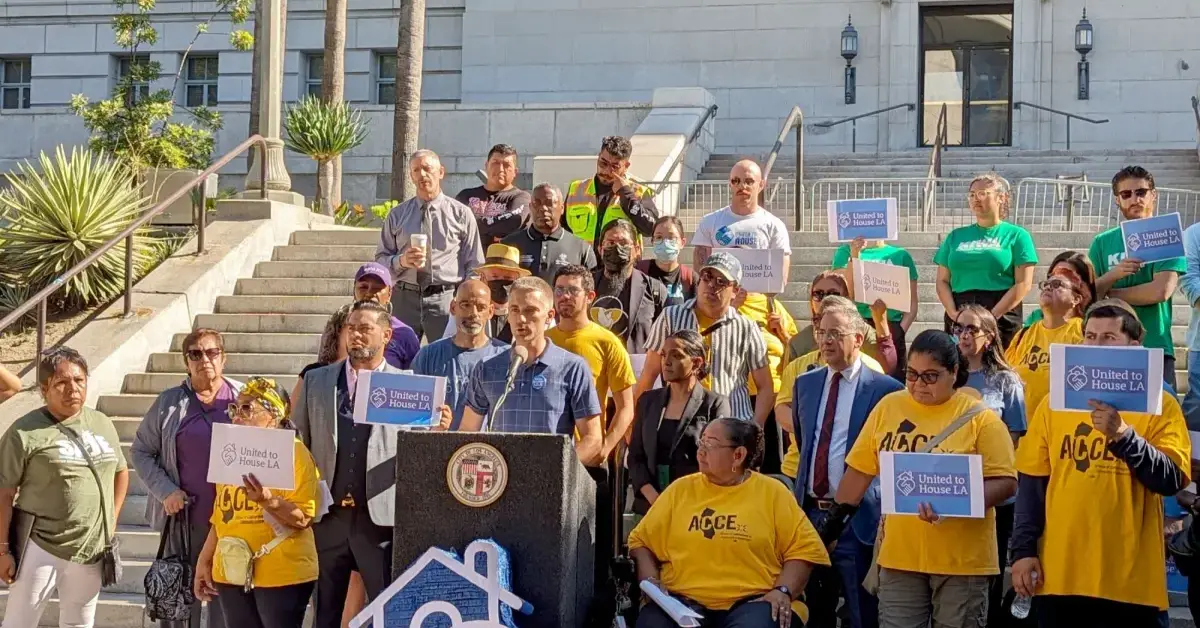California is known for its sunshine, beaches, and booming tech industry. But behind that image lies a growing problem—homelessness. In cities like Los Angeles, San Francisco, and San Diego, the number of people living on the streets has reached record highs. Tents fill sidewalks. Shelters are over capacity. Rent prices are sky-high. And now, California’s leaders and voters have taken a bold step to deal with the issue.
California voters have approved two new tax plans—United to House LA (ULA) and Measure A. These plans aim to collect more than $1.5 billion to address the housing crisis and improve services for the homeless. Both measures have strong public support and are being seen as a turning point in California’s fight against homelessness.
The United to House LA initiative is also known as the “mansion tax.” It taxes high-value property sales. For example, when someone sells a luxury home for more than $5 million, a small percentage of the sale price will now go to the city. This money will be used to build affordable housing and provide services for people who are either homeless or at risk of becoming homeless.
Measure A is focused more on mental health services and addiction recovery. It targets people living on the streets who need treatment, care, and stable housing. This includes funding for drug rehabilitation centers, mental health professionals, and facilities that support people in crisis. Together, these two measures aim to attack the root causes of homelessness—lack of affordable housing, untreated mental health issues, and addiction.
But raising money is just the first step. The real challenge is execution. Over the years, California has spent billions of dollars on housing and homelessness programs. Yet, the number of homeless people continues to rise. Critics have pointed out how slow construction is, how complicated the system has become, and how resources are often wasted or mismanaged.
To solve this problem, both ULA and Measure A come with strict oversight rules. Special independent committees have been created to track how the money is spent. Their job is to ensure transparency, accountability, and real progress. These panels will regularly publish reports showing where the funds are going and what results are being achieved.
California’s homelessness crisis is not a new problem. But in recent years, it has reached alarming levels. According to recent reports, more than 170,000 people are homeless in California. That’s nearly one-third of all homeless people in the United States. The situation has led to growing frustration among residents, who are demanding change.
Supporters of the new tax plans say this is a historic opportunity. With billions of dollars being directed toward housing, healthcare, and support systems, the state finally has the chance to reverse the damage. They argue that if the money is spent wisely, thousands of lives can be improved, and the streets can become safer for everyone.
Real estate professionals and developers have mixed feelings. Some argue that the mansion tax could slow down the luxury property market. However, others say that the housing crisis affects everyone, and wealthy homeowners should contribute more to solutions.
On the other hand, critics are warning that money alone will not solve the problem. They say the state’s current system is broken. There are too many delays, too much red tape, and not enough focus on results. Some believe that California should also work on making it easier and cheaper to build housing by cutting regulations, speeding up approval processes, and encouraging private investment.
There’s also the concern of bureaucracy. In the past, large government programs in California have faced criticism for being too slow and inefficient. That’s why the success of ULA and Measure A depends heavily on how well the new oversight bodies perform. If these panels are transparent, fast-moving, and data-driven, the funds could have a major impact. But if they fall into old patterns, the crisis could get worse.
The bigger question is whether this approach can become a model for other states. Homelessness is not only a California problem. Cities like New York, Seattle, and Portland are also struggling with similar issues. If California’s plan works, it could inspire similar strategies nationwide.
It’s also important to note that the housing crisis didn’t happen overnight. It has been decades in the making, caused by rising rent prices, low wages, limited housing supply, and untreated health issues. Fixing it will take time. The new tax measures are not a quick fix. But they do provide the resources needed for a long-term solution.
For the average California resident, this means a few things. First, if you own high-value real estate and decide to sell, you may be taxed under the new law. Second, if you live in a neighbourhood affected by homelessness, you may start seeing more shelters, mental health centres, and outreach workers in the coming years. Third, if the oversight works as planned, taxpayers will be able to see how every dollar is being spent.
This move also shows that public opinion is shifting. Instead of ignoring or criminalising homelessness, more people are now ready to invest in real solutions. California voters have spoken. They want change—and they are willing to pay for it.
There is a long road ahead. Building new housing takes time. Hiring professionals and setting up health services requires planning. Tracking results and adjusting the strategy will also be key. But for the first time in years, there’s a sense of hope that something big is being done.
In the words of many activists, California’s housing system has “completely collapsed.” These tax plans are not a cure-all, but they are a start. The next few years will reveal whether this bold move leads to real change or becomes another missed opportunity. For now, the eyes of the nation are on California—watching, waiting, and hoping for success.
Disclaimer: This article has been meticulously fact-checked by our team to ensure accuracy and uphold transparency. We strive to deliver trustworthy and dependable content to our readers.




